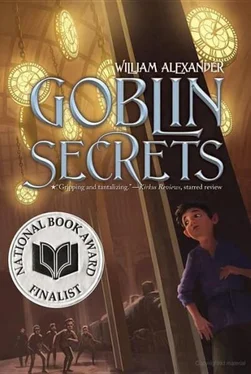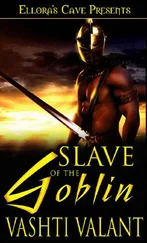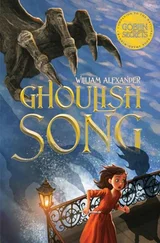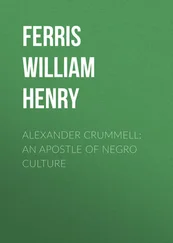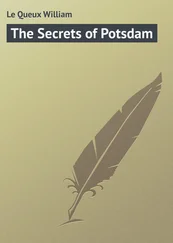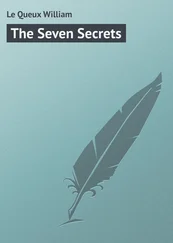Goblins gathered. Nonny offered the mask of Zombay. Rownie took it, but he did not put it on, and he did not look away from the bottomless eyes of his brother.
“Do you remember your first line?” Thomas prompted him.
Rownie nodded. “Oldest road. Older brother. Hear me. Please don’t flood.”
“Close enough,” said Thomas. “But you should actually wear that mask if you mean to speak for the city.”
“No,” said Rownie, holding up the mask of Zombay but leaving his own face uncovered. “He has to see that it’s me. He has to know that it’s me.”
The floods pounded against the pylons of the bridge beneath them. Stone creaked against stone. The workings of the clock strained against each other with metallic noises of alarm. Thomas made exasperated noises of his own. “The next line is ‘I speak for the city, and all of the city, the north and the south and the bridge in between.’”
“Please don’t flood,” said Rownie. “For me, and for everyone else, everyone in Zombay.”
The River, who was also Rowan, reached down and poked Rownie’s nose.
“Nice mask there,” he said, with the full roar of the River in the distance of his voice.
Rownie gave him a pirate scowl. “Yours is better,” he said.
“Thanks,” said Rowan. The lines of the River mask flowed on his face. “Thanks for getting me moving.”
Rownie hugged his brother, and his brother hugged him back. “You’re welcome. Please don’t flood.”
“Heard you the first time,” said Rowan. “I’ll have to leave to manage it, though.” He spoke softly, but his voice still thundered.
Rownie wanted to argue. He didn’t. He nodded instead. “Will you ever come back?”
Rowan smiled. “You’ll know how to find me.”
The brothers stood apart. Rowan set both of his hands against the upstream wall. Water flowed from his fingertips and worked its way between the stones, weakening the mortar. Rowan pushed. Several stones tumbled out and down.
Through the open space, Rownie saw the flood. It filled most of the ravine already. Waves tore boulders and trees from the shore on either side.
“Bye,” said Rowan, his eyes vast, his hair flowing as though air were water.
“Bye,” said Rownie.
His brother jumped over the edge. He cut through the air like a fisherbird, and dove down into the surface of himself.
The troupe gathered beside Rownie. They all watched as the floodwaters calmed, slowed, diminished, and passed beneath their feet and the Fiddleway Bridge.

ROWNIE LEFT THE CLOCK TOWER at evening, a greenish gray pebble in his only pocket. He passed several Fiddleway musicians, more than he had ever seen or heard on the bridge at once, but he was too much inside his own head to really hear the music they played.
He wanted to be alone at his pebble-throwing place, but Vass was waiting for him. She sat on the low stone wall, playing a string game with her fingers. She didn’t look up. Rownie climbed the wall and sat beside her.
“Did the Mayor give you your own house?” he asked.
“Oh yes,” said Vass. “A dusty and ghoul-haunted place right here on the Fiddleway, and it’s all my very own.”
“He promised you a house in Northside,” Rownie said.
“He did,” Vass agreed, “but he’s less happy with me now than he was—even though I got him safely through the tunnel. But I don’t really mind. I’m not so fond of Northside, and it isn’t a bad thing to live in sanctuary. Can’t arrest anyone on the bridge.”
She got one finger stuck in her string game, and tried to untangle it. She cursed. The web of string turned to ash and blew away. She cursed again, fished more string from a pouch at her belt, and started over. “Speaking of sanctuary, I wouldn’t leave the Fiddleway for a while. The Lord Mayor is unhappy with you. I’ve seen several posters with your face and name.”
“I don’t have a name,” said Rownie. “I only have my brother’s name, made small.” He said it without any bitterness, but Vass flinched at her own words turned back on her.
“I think it’s your name, now,” she said.
“Maybe.” Rownie looked out at the River, which still flowed higher than its usual custom. “Maybe it is my name.” He made it more true by saying it aloud.
Vass got her fingers stuck in the string again. She bit back a curse, and slowly untangled her fingers. She seemed to be struggling with words as much as she struggled with the string.
“I’m sorry,” she finally said. “I’m sorry I brought the Mayor and his Captain down on you. I’m sorry about Rowan. I didn’t know what they had done to him. I really didn’t know. I thought handing you over to the Mayor wouldn’t be nearly as bad as what Graba would’ve probably done to you. I was wrong. I’m sorry.”
Rownie looked at her, surprised. “Thanks,” he said.
Vass looked at him, and then looked away. “It seems like Graba might actually leave you alone. Southside didn’t flood. She’ll be happy about that, as happy as she ever gets, and she knows you had some part in it. So she’ll probably let you be.”
“Good,” said Rownie. “I’m glad I don’t have to worry so much about pigeons.”
The two of them watched the River flow beneath the Fiddleway. Then Vass gave up on her string game, and climbed down from the wall. “I’ll be here if you need anything cursed or charmed,” she said.
“Good-bye, Vass,” Rownie said. “Good luck with the cursing and charming.” He almost said Break your face instead of Good luck , but he thought she might take it wrong.
Once alone, his fingers found the pebble in his coat pocket. He set it on the wall and spun it a few times, like a top. Then he threw the pebble, just to say hello. Rownie watched his brother reach up to catch it.
He climbed down from the low wall and returned to the Clock Tower, through the stable doors that Semele had invited him to see. He returned to learn mask craft and swordplay and all the rest of his new profession. He returned to eat supper.
The tower smelled like cooking. It smelled buttery and good. It reminded him that he was hungry, that hunger followed him always and buzzed behind everything he did. It reminded him that he didn’t have to fend for himself here. He took off his brother’s old coat as he climbed the stairs and found a costume rack to hang it on. It felt strange to be without it.
Someone—probably Nonny—had put a wood stove outside the pantry and propped up a long metal pipe for a chimney. Cooking smoke climbed the pipe and rose through the tower’s workings.
Thomas stood by the stove in an apron. He spooned several dollops of dough onto a flat metal skillet. Semele sat nearby with a book in her hands and her feet on a stool, toes pointed at the stove to soak up its warmth. Nonny, Patch, and Essa all sprawled on the floor, playing cards. Thomas looked up at the boy, grunted, and scooped a finished flatbread onto a plate.
“Don’t burn your fingers,” the old goblin said.
Rownie took the plate and sat down with the rest of his troupe. His fingers twitched and his mouth watered, but he waited for his supper to cool.
~~~ ~~~
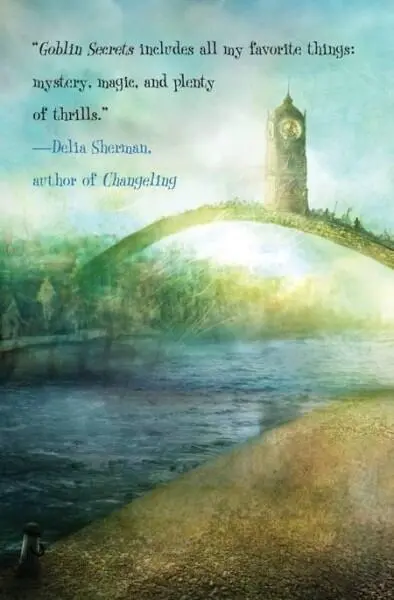
AN ENSEMBLE CAST AND CREW created this book, and I am profoundly grateful for the professional, aesthetic, and emotional support I’ve received along the way.
Читать дальше
